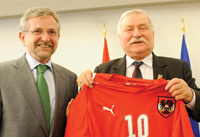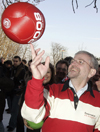Being a good sport has different connotations these days. Sports and sports events are just as much about the balance sheet as the clean sheet, so the predictions were that Austria and Switzerland, co-hosts of football’s Euro 2008 event, would receive about €250m each.
But there’s more: some argue that there are longer-term economic benefits too, a so-called ‘brand legacy’, where host countries are rebranded as fashionable and vibrant places to live, work and invest.
Advertisement
Simon Chadwick, author of a report on the economic value of Euro 2008 commissioned by MasterCard Europe, and a professor of sport business strategy and marketing at Coventry University Business School, explains: “There is a tangible post-event legacy. It puts a country firmly on the global economic map.”
Since hosting the 1992 Olympic Games, Barcelona has developed from a relatively introspective urban centre to an international success. Mr Chadwick says this is no coincidence: “The Olympics rebranded Barcelona as an ultra-chic, global, fashionable destination.”
Though Austria and Switzerland are already healthy economic hubs, Euro 2008 could well leave its economic mark on these countries too.
Austria in fact has seen considerable foreign investment of late; its total for 2007 was €22.4bn, according to Austrian National Bank statistics. Capital city Vienna boasted a 55% increase in foreign investment in 2007 compared with the previous year, with 115 international companies settling in the capital. Importantly, its location at the centre of Europe means it is considered the stepping stone to companies interested in central and eastern European countries, such as Romania, Bulgaria and Turkey.
It is also an attractive market in its own right. Kramer Pferdesport, a German equestrian sports equipment company based in Hockenheim, which sells its horse-related products across Europe, opened in Austria in 2007. Frank Schmeckenbecher, one of the company’s owners, says that Austria is already “a growing and promising market” for Kramer Pferdesport.
But Euro 2008 is likely to have raised the country’s profile in the international arena. Vice-chancellor and finance minister Wilhelm Molterer told fDi: “I am convinced that Euro 2008 will have a positive impact on Austria’s profile in the world. It was a perfect event: hundreds of millions of TV spectators have now got an image of our country. This has been a great opportunity for our country to present itself to the world.”
Advertisement
|
|
Ten spot: Mr Molterer with Euro 2008 guest, Nobel Prize winner Lech Walesa |
Switzerland is already an international hub of corporate headquarters as a result of its political and social stability, business-friendly tax regime and strong currency. It has seen more and more new entrants in recent years, including Google, which moved to Zurich (one of fDi’s Top 20 Expat Cities) in 2004. Brazilian mining company Vale, the world’s leading producer of iron ore, is opening up in St Prex in 2009, and the UK pharmacy chain Boots’ parent company, Alliance Boots, has decided to relocate to Switzerland because, says a spokesperson, “we believe it enhances the position of Alliance Boots as a leading international pharmacy-led health and beauty group alongside a number of the world’s leading pharmaceutical manufacturers”.
In addition, Swiss-based companies are increasingly attracting foreign capital: Sebastien Jeanneret, founder and chief executive of luxury gift company DeLafée International, which has grabbed media attention by producing chocolate sprinkled with real gold, says he has “regular enquiries through banks and law firms or directly from individuals wanting to invest, perhaps 15 or 20 in the past three years”.
He adds: “My company is definitely more attractive to the outside investor because it is in Switzerland; they trust it as a brand.”
Total recall
But even in gold-plated Switzerland, Euro 2008 may have some discrete tangible benefits. Alongside a brand legacy, a huge tournament such as Euro 2008, if successfully played out, demonstrates to the rest of the world that the host country can successfully manage the demands of such a global event. This leads to what Mr Chadwick calls “brand recall”, improving the profile of these countries on the international stage, or as a spokesperson at the British-Swiss Chamber of Commerce puts it: “There will be a legacy from foreign visitors who spread the word about the country’s assets.”
It is a two-way process. The championship has converted some of Austria and Switzerland’s more reserved inhabitants who were perhaps nervous of what Euro 2008 could bring. The official slogan chosen by UEFA, ‘Expect emotions’, reflected a perception that the host countries were places where football passions on the city streets were not the norm.
As Burkhard Weiler, project manager in the international business division of the Vienna Business Agency, observes: “Even though the forecasts had been a bit cautious concerning security risks and possible riots, there has been a very positive acceptance [of Euro 2008], and the picture was a peaceful championship with a positive climate.” This should encourage both countries not only to host other sports events, but also to seek out foreign capital.
But notions of brand legacy have their sceptics too. Mr Jeanneret says that Euro 2008 will have “little or no impact” on Switzerland’s ability to attract foreign investment: “It’s about the attractions for the expat, and the tax system.”
Others are simply more cautious. “We cannot estimate yet if [Euro 2008] will lead to increased foreign direct investment,” says Mr Molterer. “However, we are continuously working on the attractiveness of Austria as a business location – we have, for example, recently lowered our corporate tax [to 25%]. This should strengthen our competitive position and create more jobs in our country.”
There is a good chance, however, that fans and investors alike will recall Euro 2008 as much a Swiss or Austrian success for co-hosting it as a Spanish one for winning it.

